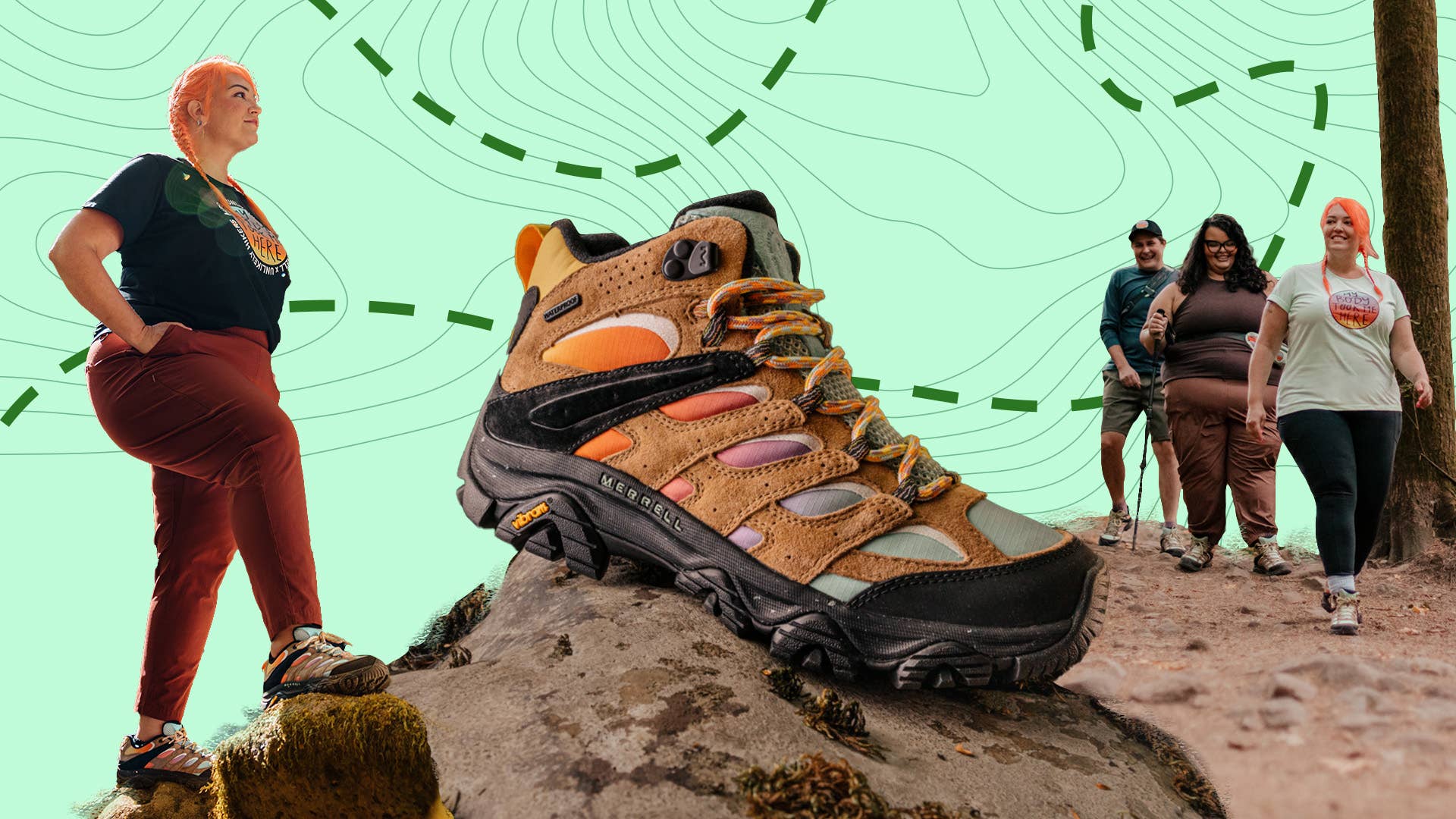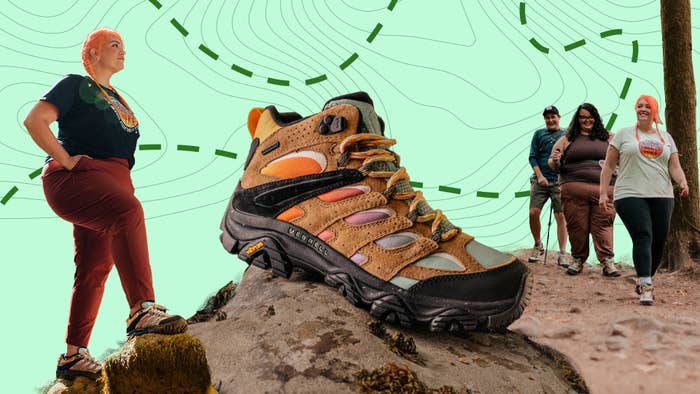
In 2017, Jenny Bruso founded Unlikely Hikers with a mission: make the outdoors more accessible for plus-size people, queer people, people of color, disabled people, neurodivergent people, and anyone else who might not fit narrow definitions of what an outdoors enthusiast should be. Since then, Unlikely Hikers has grown in popularity, leading hikes and offering accessibility, support, and guidance to anyone who needs it. That success has also brought collaborations with major outdoor brands like Merrell, including an Unlikely Hikers Moab 3 and a capsule collection of apparel and gear that just dropped this month. To learn more about that Merrell collab and to get her insights on running a “diverse, anti-racist, body-liberating outdoor community,” Complex linked up with Bruso for a chat. Read her thoughts below, then check out the Merrell Unlikely Hikers collection here.
Thanks for talking with us, Jenny! Can you explain why you founded Unlikely Hikers and why it’s so important for breaking down barriers and getting people outside?
I am very intimately aware of how not seeing ourselves represented in outdoor culture and media can subconsciously affect where we think we belong. While I grew up spending so much of my childhood outside, I didn’t do what we define as “outdoorsy” things, like hiking or camping. And as a queer, plus-size person, I did not connect with what I saw portrayed as outdoors culture in the media.
It’s not that I didn’t want to hike or camp, it’s that I didn’t know they were even options for me and this is true for a lot of people. Representation is an invitation. It creates possibility and we need this representation more than ever with the climate crisis, because we need more passionate stewards of the lands we love.
There are so many things I’d never thought of doing like rock climbing, running, backpacking, and kayaking until I saw other plus-size folks doing them. Those were instant lightbulb moments for me. I had to assume there were many folks like me having these moments and I wanted to find them and build a new outdoors community of representation, equitable access, safety and stewardship. This was the beginning of Unlikely Hikers.
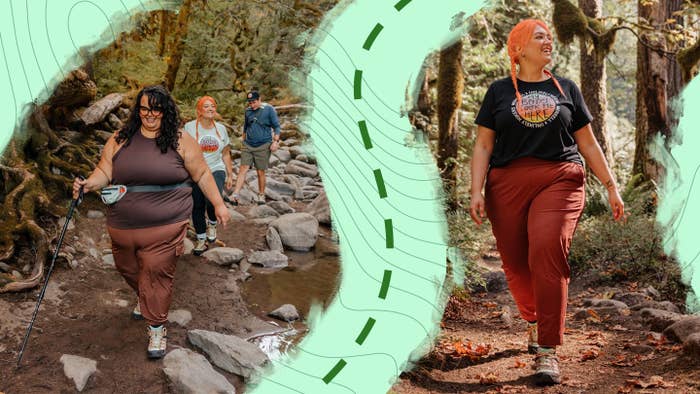
Unlikely Hikers has a motto: “Nature is infinitely diverse and so are we.” That’s so true, but why do you think so many people have had trouble seeing that, particularly when it comes to outdoor activities like hiking?
I really want to be clear and not soften this the way we often do: the outdoors has been treated like something to be owned since the beginning of colonization and tendrils of this still exist in how we think about and interact with the outdoors. There is a pervasive attitude—though it is often coded—that the outdoors belongs to folks who fit the mold of what we’ve defined as dominant culture: white, cisgender, heterosexual, usually affluent, able-bodied, and thin. Anyone that doesn’t fit those criteria is seen as an outlier in these spaces. It takes one quick scroll on the social media pages of any corner of the outdoor industry to see that even the image of a Black person, a group of plus-size hikers, or simply a conversation about recreating on land stolen from our First Nations, is met with anger, disbelief, discomfort, and claims of “virtue signaling.” This happens to us on the trail, too. It should be as simple as this: we are out here because we love it. We love it like anyone loves it, though we want to protect it, not own it because it belongs to all of us.
Nature has been showing us from time immemorial that diversity is natural. Normal. Outside we delight in the largest and smallest things. We don’t measure a river’s beauty by its size. We don’t toss out our rubber tree houseplants because they’re not as grand as the redwood. We are delighted by the tiniest mushrooms and likewise amazed that the largest living organism on earth is also a fungus. From the giant boulders at Joshua Tree National Park to the tiny agates we find at the beach, we delight in the boundaryless vastness of nature and we accept its diversity with an ease and joy that we don’t allow of our fellow humans. Our world would be so different if we did and I deeply believe that we can, but not without calling out the systems in place that inform this lack of equity.
With that mission in mind, can you go back and explain when you founded Unlikely Hikers and how long it’s been active?
I founded Unlikely Hikers (UH), a diverse, anti-racist, body-liberating outdoor community for everyone who doesn’t fit the outdoorsy status quo, in June of 2016. I’d been finding my own way into the outdoors for just a few years at that point and deeply wanted to find and create community with others whose lived experiences informed their relationship to the outdoors. We’re an Instagram community and a nationwide hiking group. We are adventurers who are plus-size and fat, Black, Indigenous, People of Color, 2SLGBTQIA+, disabled, neurodiverse, and beyond. We believe that everyone has a unique story and that the outdoors can bring all of us healing and connection.
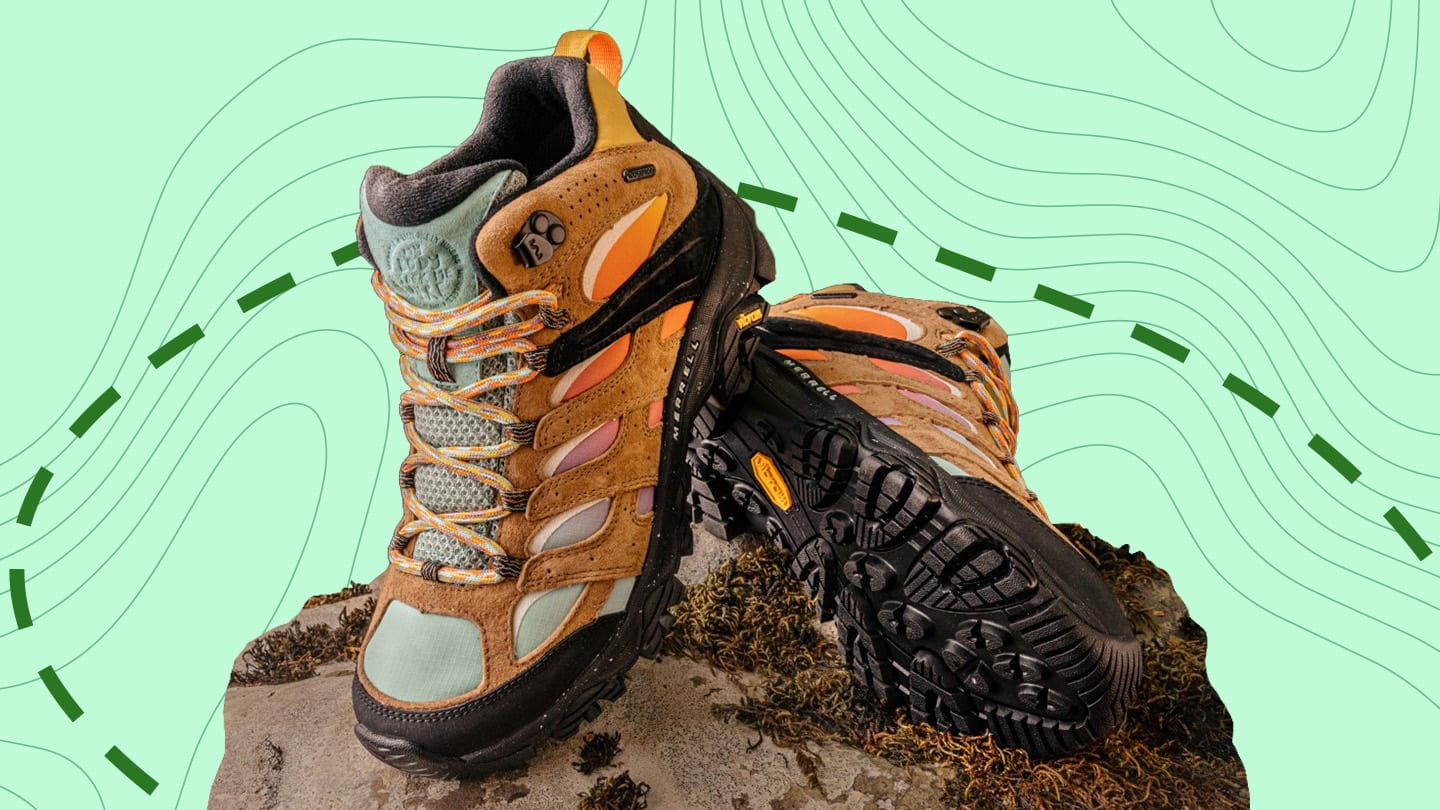
Moab 3 Mid Waterproof x Unlikely Hikers | $145
And after starting Unlikely Hikers, what was the response like? Were people immediately drawn to it?
I knew I wasn’t special in needing something like UH, but I couldn’t have guessed how it would blow up. Thousands of people of all identities all over the world, though primarily in the U.S. and Canada, began following us immediately and began asking for group hikes. I didn’t even know if leading hikes was something I wanted to do, but when I see a need, I get curious. We announced our first group hike about eight months after we started and now we lead multiple hikes a month all over the U.S., with many more to come in 2023 as we open even more group hiking chapters, hopefully worldwide.
Our first group hike was in Portland, Oregon, at a place called Forest Park in 2017. We had about 12 or so hikers and though I had the best of intentions and those early hikes were so much fun, becoming a good leader has come with time and experience. Our hikes are so successful because of what we learn from our participants. So many things about UH exist because of what people tell us they want. Creating access and addressing needs is so important to us.
When did you first know Unlikely Hikers could be something huge, with so many people following you, attending your hikes, and then even collaborations like this one with Merrell?
The goal was never to be huge and it took me years to really understand the magnitude and contribution of UH and of myself. Those early days were a unique time in outdoor culture, where many outdoor groups were forming and advocating for change in the outdoor industry and outdoor culture. A wave was growing and I was lucky to be a part of it with so many incredible groups like Melanin Basecamp, Brown People Camping, Latino Outdoors, Outdoor Afro, and so many others. A year into UH’s existence, we received our first brand partnership with REI. Merrell came shortly after that, along with other partnerships. UH became my full-time job and I was able to hire support to help it grow into what it is today and will become tomorrow. We are grateful for this support and the increased level of access these partnerships give me to advocate for necessary change.
Then, moving on to your collaborations with Merrell. This is Unlikely Hikers’ second time working with the brand. What did you learn the first time around and how did that affect what you did here for your second collaboration?
Our first collaboration was with the Merrell Zion, which was a more specialized hybrid sneaker-boot. Because that was our first attempt at this and we were taking such a big risk, we didn’t go as full out, though it was a truly unique gender neutral shoe design in all teal and black. We increased the sizing beyond Merrell’s standard offerings, which was crucial to me. Without that expanded sizing, it wouldn’t truly be an Unlikely Hikers collab. We also had a small line of merch that went up to a size 4XL in that first collab. The collection was a huge success and people have been asking me about a second collab ever since. So I was thrilled when Merrell approached me again, this time about featuring my personal go-to, the Moab 3. We took a bigger risk with the design this time, creating a dreamy light seafoam colorway with a rainbow gradient inspired by sunsets and sunrises. We also created a low top version and extended the sizing of the accompanying merch to a 6XL, because we wanted to increase the accessibility of these products even more.
As you said, the colorway on this Unlikely Hikers’ Moab 3 is really beautiful and a bit different from what you usually see on boots and outdoor gear. Can you talk about what the colorway means and why you chose it?
Blues and greens are so soothing to me. Color inspires me. It gives me life. We often assign dark and neutral tones as “earth tones,” but all colors are of the earth. My neutral is any kind of teal and I’m in love with the beauty and metaphors of sunrises and sunsets. I wanted to see all of this represented in this shoe. As a plus-size person, I am used to seeing what few options I get for gear and clothing in my size being in muted colors, no patterns, no style, and frankly, it’s disrespectful. I don’t want to blend in. I want to express that I am here on purpose.
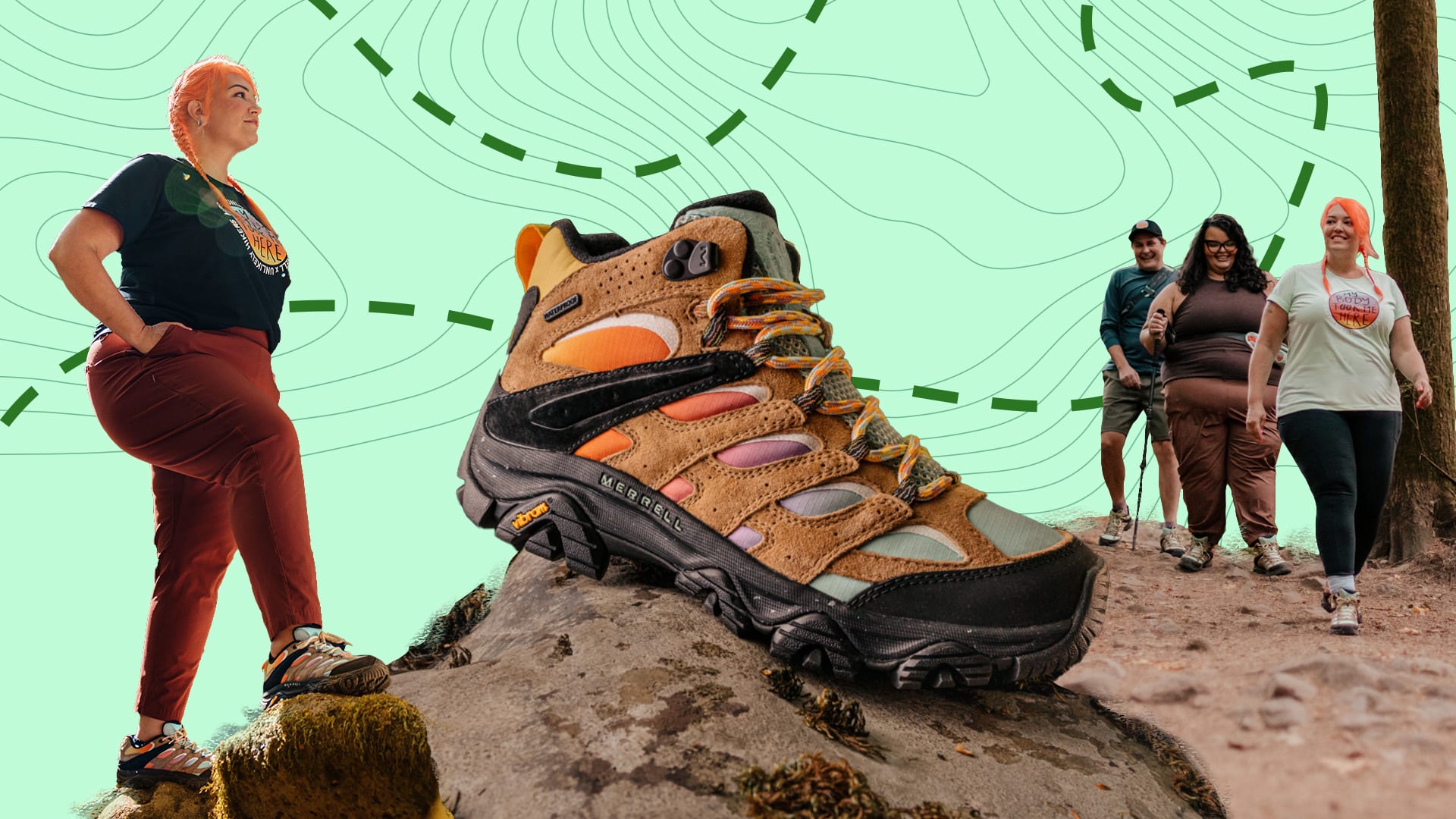
Moab 3 Mid Waterproof x Unlikely Hikers | $145
As you noted, this whole collection is designed to be inclusive and comes in a wide range of sizes, including rare widths for the Moab 3. That’s very cool. How important are details like that for making the outdoors more accessible to a diverse range of people and communities?
Clothing and gear that fits is an invitation to do the things we want to do and really experience the potential of what we are able to do. Making things work for us that weren’t designed for us means ending adventures early because of discomfort. Many of us even get so used to the discomfort that we don’t even know that we are capable of doing more! More importantly, bad-fitting gear can be a safety issue and result in serious injury in certain environments. It can also be the difference between trying a new activity and not. The more people we can get into the outdoors, the more stewards and advocates we’ll have for protecting these lands. Lastly, and most simply, this kind access shouldn’t be so complicated for some and easy for others.
And what’s your favorite part about getting to design a Moab 3 and a related apparel and accessories capsule?
Being able to include the artist, Olivia Chase, who designed all of our UH logos—including the script for “My Body Took Me Here” as seen on the UH X Merrell collab—is so special to me. Olivia’s rendering of what I’ve envisioned feels so cosmically meaningful to me.
Why did you choose the Moab 3 as your canvas? Is there functionality there that you like?
Merrell actually approached me about the collab for the new Moab 3, but I think that’s because they know I’ve been wearing the Moab mids for years. It’s my favorite boot and now it’s even better, ha! I need the ankle support, tougher footbed and traction on these rocky, slippery Pacific Northwest trails I call home.
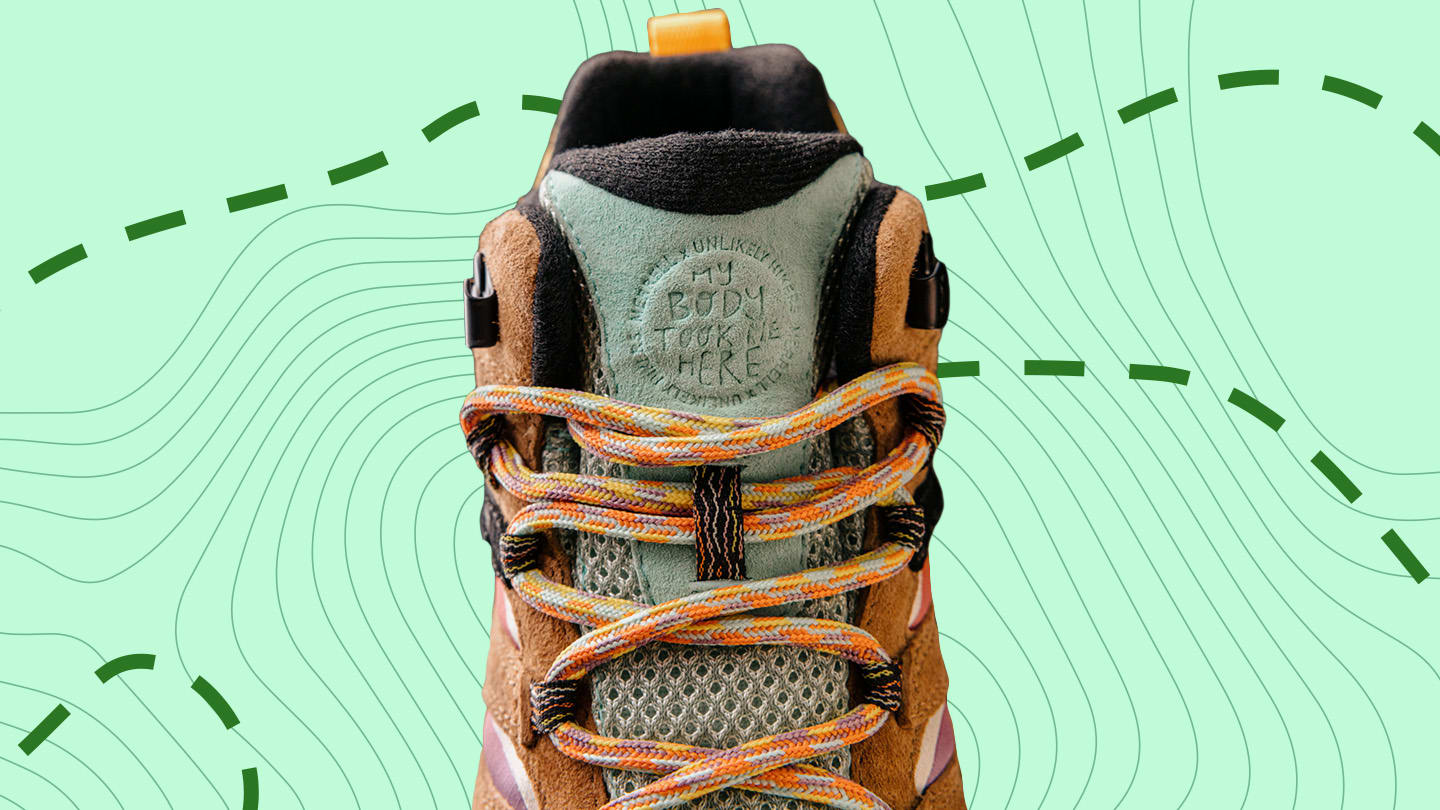
Moab 3 Mid Waterproof x Unlikely Hikers | $145
I know Merrell recently released an Inclusivity in the Outdoors survey, which found that the LGBTQ+ community and people of color were much more likely to experience discrimination when outdoors compared to straight people and white people. Did you ever anticipate that Unlikely Hikers would actually be an organization that would help people feel safe outdoors?
Lack of access doesn’t exist on its own and can’t be addressed without addressing the real harm and barriers hikers outside of the status quo are experiencing. This has always been foundational to what UH is and it was not a happy accident. We are very proud to provide safer and empowering experiences that demystify getting outdoors for all hikers.
Lastly, what’s the most fun thing about founding and running Unlikely Hikers? Is there something you’re most proud of there?
People love to say the outdoors is free and for everyone and that no one is keeping anyone from getting outside, but the reality is much more complicated than that. Building this community with everyone who finds their way to UH has opened my world in a way I never could have imagined. There are so many things I’ve tried that had never previously occurred to me because of seeing other queer and plus-size hikers and adventurers do them. I am so grateful to be a part of this new outdoors narrative that is truly for us, by us.

